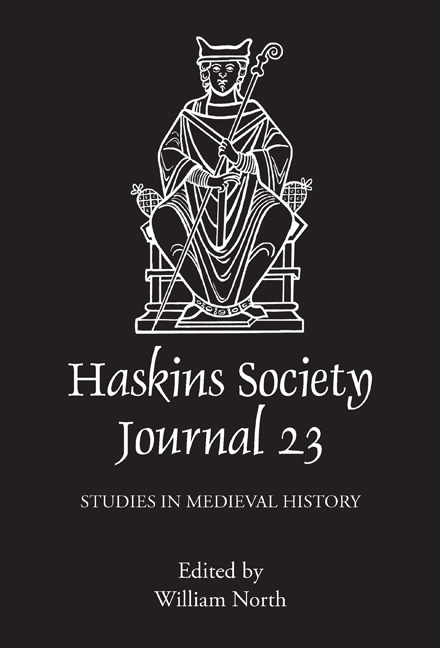Book contents
- Frontmatter
- Contents
- List of Figures
- Editor's Note
- Abbreviations
- 1 Francia and the History of Medieval Europe
- 2 Royal Control and the Disposition of Estates in Tenth-Century England: Reflections on the Charters of King Eadwig (955–959)
- 3 Denis Bethell Prize Essay: Frutolf of Michelsberg's Chronicle, the Schools of Bamberg, and the Transmission of Imperial Polemic
- 4 Manipulating Historical Memory: Cosmas on the Sees of Prague and Olomouc
- 5 Poetry and History: Baudry of Bourgueil, the Architecture of Chivalry, and the First Crusade
- Authors' Preface to Chapters 6 and 7
- 6 Men and Masculinities at the Courts of the Anglo-Norman Kings in the Ecclesiastical History of Orderic Vitalis
- 7 Men and Masculinities in William of Malmesbury's presentation of the Anglo-Norman Court
- 8 The Personnel of Comital Administration in Greater Anjou, 1129–1151
- 9 The Murder of Gilbert the Forester
- 10 The Object as Subject in Medieval Art
Authors' Preface to Chapters 6 and 7
Published online by Cambridge University Press: 05 November 2014
- Frontmatter
- Contents
- List of Figures
- Editor's Note
- Abbreviations
- 1 Francia and the History of Medieval Europe
- 2 Royal Control and the Disposition of Estates in Tenth-Century England: Reflections on the Charters of King Eadwig (955–959)
- 3 Denis Bethell Prize Essay: Frutolf of Michelsberg's Chronicle, the Schools of Bamberg, and the Transmission of Imperial Polemic
- 4 Manipulating Historical Memory: Cosmas on the Sees of Prague and Olomouc
- 5 Poetry and History: Baudry of Bourgueil, the Architecture of Chivalry, and the First Crusade
- Authors' Preface to Chapters 6 and 7
- 6 Men and Masculinities at the Courts of the Anglo-Norman Kings in the Ecclesiastical History of Orderic Vitalis
- 7 Men and Masculinities in William of Malmesbury's presentation of the Anglo-Norman Court
- 8 The Personnel of Comital Administration in Greater Anjou, 1129–1151
- 9 The Murder of Gilbert the Forester
- 10 The Object as Subject in Medieval Art
Summary
These associated articles offer exploratory investigations into constructions of masculinity at the courts of the Anglo-Norman kings as contributions to the larger study of gender in the Anglo-Norman realm. Using contemporary chronicle accounts, each examines representations of men and masculine behaviour at the royal court during the eleventh and twelfth centuries. Recent historiography has seen this period as critical in the emergence of courtly behaviour and ideas. Much of this has been in response to Norbert Elias' great book, The Civilizing Process, which saw the courts of early modern European monarchs as focal points for the diffusion of civilized behavioural norms that helped stabilize the state as a whole. It was C. Stephen Jaeger, however, who first investigated how Elias' thesis related to the Middle Ages and ultimately challenged the Elias narrative. For Jaeger the great moment and mechanism of social change was to be found not in the early modern period but in late tenth-century Ottonian Germany. It was here in the figure of the courtier bishop that Jaeger traced how a new social code, devised from classical models, allowed the court to be identified as a civilizing institution that helped promote political cohesion. Despite their chronological differences both Elias and Jaeger are concerned with larger historical narratives and debates concerning the role of the court within the transformation of the state and the nation.
- Type
- Chapter
- Information
- The Haskins Society Journal 232011. Studies in Medieval History, pp. 103 - 104Publisher: Boydell & BrewerPrint publication year: 2014



